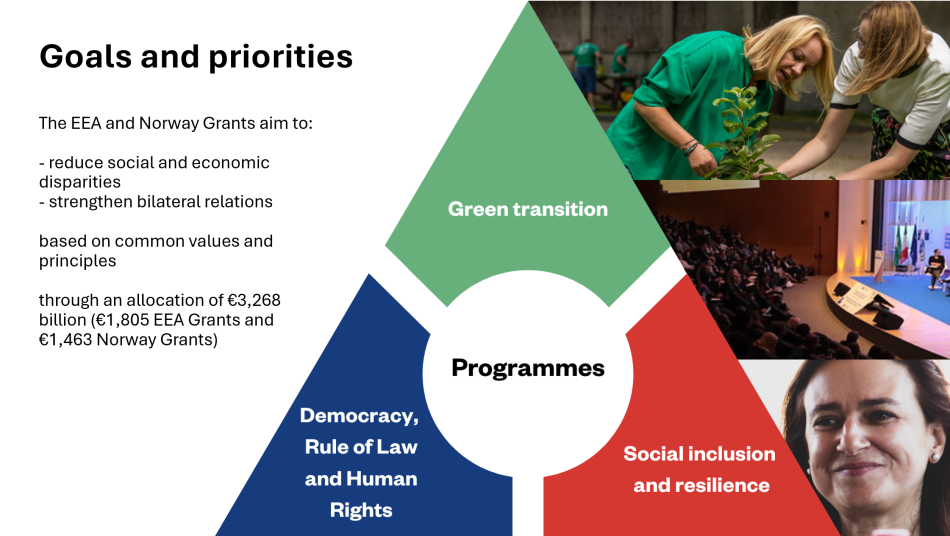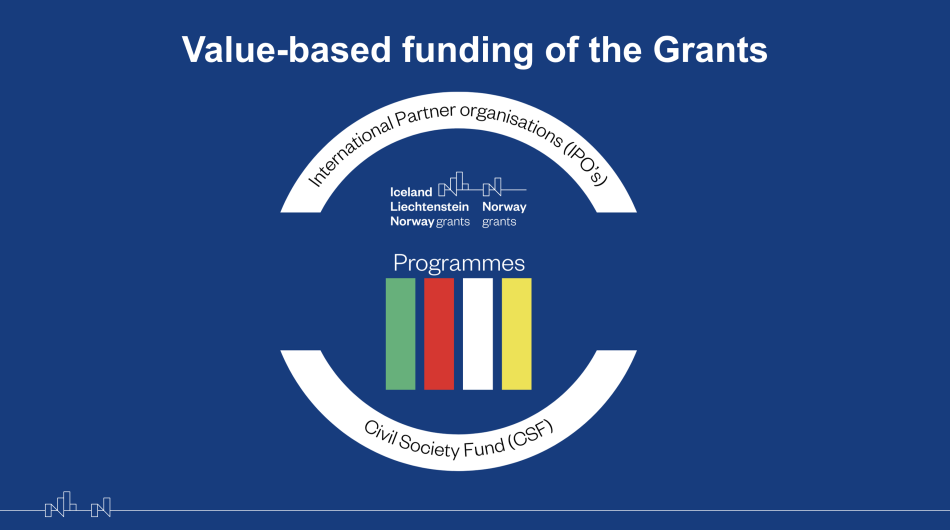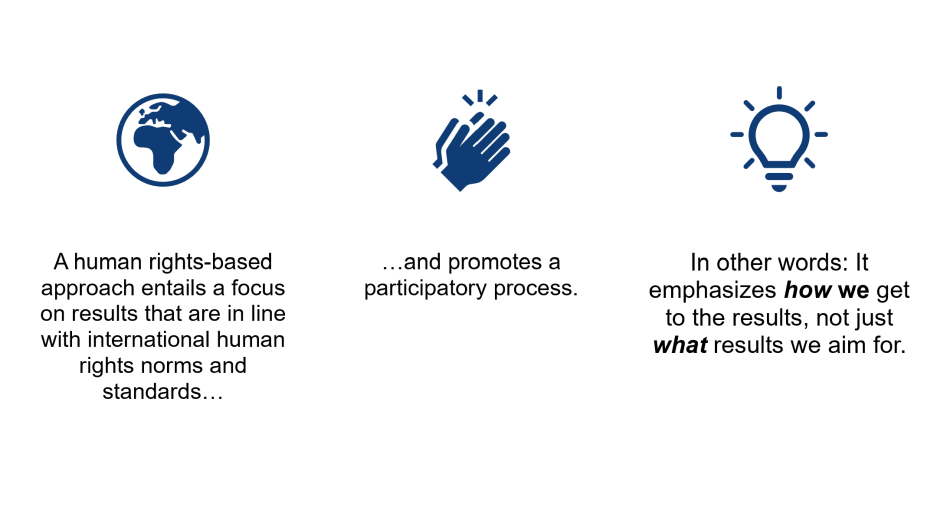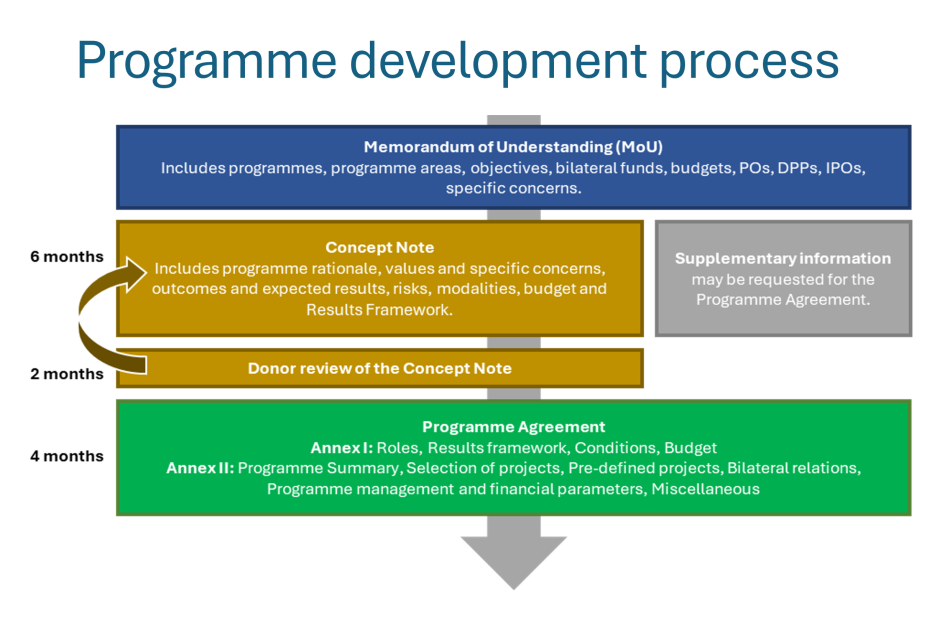The EEA and Norway Grants 2021–2028
Working together for a green, democratic and resilient Europe
For more than two decades, Iceland, Liechtenstein, and Norway have worked closely with partners in EU Member States to help reduce social and economic disparities and to strengthen bilateral cooperation through the EEA and Norway Grants. Guided by shared European values, their cooperation is firmly rooted in the principles of democracy, the rule of law, and respect for human rights.
Twenty years after the 2004 enlargement of the EU, significant achievements can be seen in economic growth and reduced disparities within the European Economic Area. However, gaps in economic development and living standards persist. Digital transformation, climate change, and geopolitical tension and conflict are reshaping Europe. Continued efforts and cooperation are essential to further reduce disparities, safeguard a strong and democratic Europe, and promote inclusive and resilient societies.
To reduce social and economic disparities and to strengthen cooperation with 15 EU Member States (Beneficiary States), Iceland, Liechtenstein, and Norway (Donor States), together with the European Union, have agreed to continue the EEA and Norway Grants for a fourth period, 2021–2028, with a total budget of €3.268 billion, divided between €1.805 billion for the EEA Grants and €1.463 billion for the Norway Grants.
The EEA and Norway Grants 2021–2028 build on the successes of the 2014–2021 period and will promote the following three thematic priorities:
-
European green transition
-
Democracy, rule of law and human rights
-
Social inclusion and resilience

Digitalisation is a cross-cutting priority that supports all three thematic areas. It is recognised as a key driver of sustainable economic growth, social inclusion, and effective governance, as well as a tool for strengthening democracy and public trust. The Grants will support responsible and inclusive digital transformation, while addressing challenges such as data security, disinformation, cybercrime, and unequal access to technology.
Partnership is at the heart of the Grants: they foster lasting collaboration between organisations and institutions in Iceland, Liechtenstein, and Norway, and those in the Beneficiary States, promoting the exchange of knowledge, innovation, and best practices across Europe.
Ragna Fidjestøl, Managing Director at the EEA and Norway Grants
Addressing the consequences of the invasion of Ukraine
The EEA and Norway Grants provide a financial contribution of €183 million (€100 million from the EEA Grants and €83 million from the Norway Grants) for projects responding to challenges arising from the invasion of Ukraine. These projects are implemented across programme areas and funds, based on needs identified in the Beneficiary States.
Partnership and cooperation
The preparation and implementation of all programmes are carried out in partnership at both the programme and project levels. Bilateral cooperation is an essential feature of the Grants, ensuring that entities from Iceland, Liechtenstein, and Norway work together with counterparts in the Beneficiary States to develop joint solutions, transfer knowledge, and strengthen capacity. Digital tools and processes will further facilitate cooperation, learning, and innovation across borders.
The implementation of the EEA and Norway Grants 2021–2028 is governed by the Regulation on the EEA Financial Mechanism 2021–2028 and the Regulation on the Norwegian Financial Mechanism 2021–2028. The EEA and Norway Grants are based on the common values and principles of respect for human dignity, freedom, democracy, equality, the rule of law and respect for human rights, including the rights of persons belonging to minorities.
A value-based approach
The EEA and Norway Grants are a value-based funding mechanism grounded in the shared European principles of democracy, rule of law, and human rights. These values are both the foundation of the Grants and one of the three overarching priorities of the 2021–2028 period. They are interdependent: democracy relies on the rule of law and human rights, and human rights are best realised in democratic societies. Together, they safeguard the freedom and dignity of individuals and are key to Europe’s sustainable security.

Support for democracy, rule of law, and human rights is implemented at three complementary levels:
-
International cooperation: Partnerships with international organisations such as the Council of Europe (CoE), the European Union Agency for Fundamental Rights (FRA), and the Organisation for Economic Co-operation and Development (OECD) strengthen policy, legislation, and institutional capacity, ensuring alignment with EU and global standards.
-
Programmes and projects: All programme areas promote these values by integrating gender equality, inclusion, and non-discrimination throughout implementation.
-
Dedicated funds: The EEA Civil Society Fund supports civic engagement, media literacy, gender equality, and anti-discrimination efforts, while the Fund for Social Dialogue and Decent Work promotes fair working conditions and social dialogue.
Human rights at the core of the Grants
A human rights-based approach underpins all activities. It promotes participation, non-discrimination, transparency, accountability, and equality, while ensuring that beneficiaries are active partners, that vulnerable groups are included, and that information and justice are accessible to all.

Gender equality and mainstreaming
Gender equality is a core value in the implementation of the EEA and Norway Grants and is integrated throughout all programme areas. Gender perspectives are considered in programme design, implementation, and evaluation, both as a guiding principle and through targeted activities in relevant programmes. This dual approach ensures that all programmes promote equal opportunities while specific initiatives advance gender equality more directly, such as supporting work–life balance and combating gender-based violence.
Through this approach, the EEA and Norway Grants create synergy between initiatives at international, national, and local levels, working together for a more democratic, fair, and resilient Europe.
The Grants' partners
The National Focal Point (NFP) is the main partner in each Beneficiary State. It has the overall responsibility for the implementation of the Memoranda of Understanding (MoU) and for ensuring that all programmes contribute to the objectives of the Grants.
A Programme Operator (PO) is responsible for preparing and implementing the individual programme and for selecting and contracting projects funded.
A Donor Programme Partner (DPP) is a public entity from a Donor State advising and participating in the preparation and/or implementation of a programme. Its contribution is agreed upon between Donor and Beneficiary States.
An International Partner Organisation (IPO) is an international organisation or an institution designated by the EEA Financial Mechanism Committee (FMC)/Norwegian Ministry of Foreign Affairs (NMFA) and involved in the implementation of the EEA and Norway Grants 2021–2028.
The Donor States have delegated decision-making powers to the FMC with respect to the EEA Grants, and to the NMFA for the Norway Grants. The Financial Mechanism Office (FMO) serves as the secretariat for both the EEA and Norway Grants.
Programme development and implementation

Based on the Blue Book, the Donor States enter into negotiations on MoUs with each Beneficiary State. The MoUs are drawn up for the EEA Grants and for the Norway Grants separately, identifying the programme areas and programmes to be funded. The aim is to tailor the support to each country based on its needs, aims, and capacity, as well as the bilateral interests shared by the Donors and the Beneficiary State.
The MoU describes the management arrangements, including that of the Programme Operators, and the cooperation with the Donor Partners and IPOs. Programme development in each Beneficiary State formally starts once the respective MoUs have been signed.
Programmes are developed in line with the MoUs and the Blue Book. The Programme Operator develops a short concept note in cooperation with the Donor Programme Partners, IPO(s), and the FMO. The concept note defines the scope and planned results of each programme. The EEA and Norway Grants apply results-based management, seeking to ensure that the programmes and funds achieve their intended objective. The concept note is submitted to the Donor States through the NFP.
Based on the concept note and the assessment of the Donor States, a programme agreement is signed between the Donor State and the Beneficiary States. The programme agreement sets out the terms and conditions for the implementation of the programme and the roles and responsibilities of the parties involved.
A programme may combine a number of programme areas. A project must contribute to only one programme area objective.
The objectives of the programmes and of the EEA and Norway Grants are achieved through projects and bilateral initiatives. Projects are generally selected through competitive procedures but can also be pre-defined in the MoUs or in the programme agreements. Once the programme agreement is signed, the Programme/Fund Operator launches one or more open calls for proposals, selects projects in cooperation with a Selection Committee, and signs project contracts with the project promoters.
Find out more about our programme areas here.